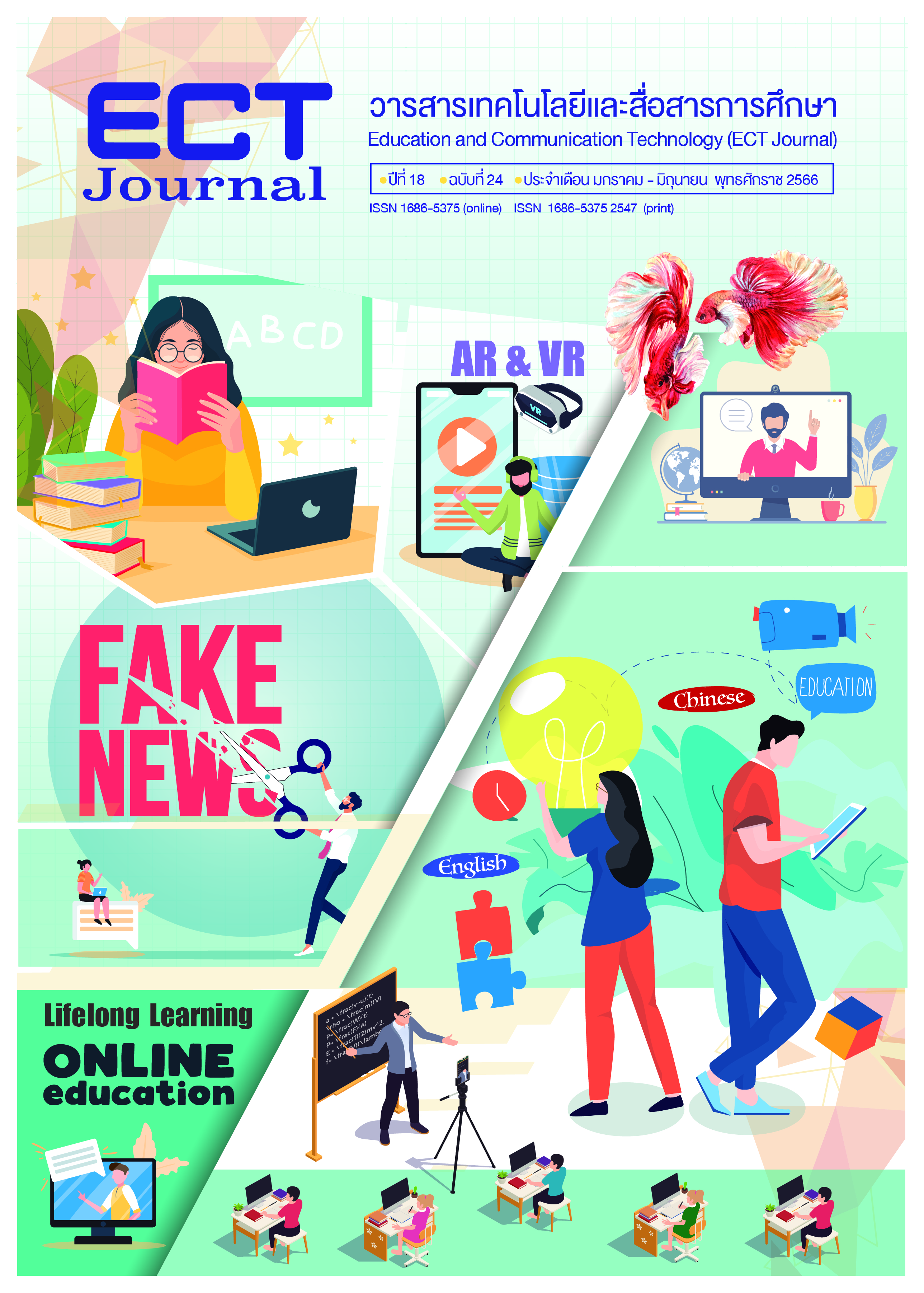The study of the need for Approaches to Micro- Learning Based on Scenario-Based Learning for Mobile Learning Platform to Enhance Employees’ Self-Development skills
Keywords:
mobile learning platform, micro-learning, Scenario-Based Learning, self-development, operational staffAbstract
The purposes of this research were 1) to study the condition and compare the skills for self-development of the learners Classified by age, working age, number of hours of learning and job satisfaction 2) to study background factors user experience and assessing needs of operational employees in using technology to promote self-development skills. The sample group was 72 operational staff in Bangkok using a purposive sampling method keep quotas divided into system employees and product staffs 36 people per side. The research instruments were a questionnaire with a confidence value of 0.97 with ranking checklist questions and estimation scale. The statistics used in the data analysis were frequency, percentage, mean, standard deviation, One-way ANOVA and Modified Priority Needs Index (PNI Modified) techniques were used to prioritize needs. The results showed that 1) Age affects the use of technology in acquiring knowledge and the utilization of learning through mobile phones. In addition, working age affects the purpose of using technology and taking advantage of mobile learning. The number of learning hours had different effects on the use of mobile phones for Internet learning. When considering job satisfaction, it was found that the learners shared different ways of exchanging knowledge on the forum. 2) the need for knowledge-based media for overall self-improvement When analyzing each finding, it was found that the device used to acquire knowledge had the highest need index, followed by learning style. and readiness for learning via mobile phones, respectively
References
กระทรวงศึกษาธิการ. (2564). แผนปฏิบัติการดิจิทัลเพื่อการศึกษา กระทรวงศึกษาธิการ พ.ศ.2563-2565. https://bict.moe.go.th/wp-content/uploads/2022/03/digital-63-65.pdf
กาญจนาภา วัฒนธรรม และจินตวีร์ คล้ายสังข์. (2564). การศึกษาการใช้เทคโนโลยีสารสนเทศความต้องการจำเป็นและปัจจัยที่ส่งผลต่อการใช้โมไบล์แอปพลิเคชั่นเพื่อส่งเสริมทักษะการฟัง-พูดภาษาจีนของนักเรียนระดับชั้นมัธยมศึกษา. วารสารเทคโนโลยีและสื่อสารการศึกษา คณะศึกษาศาสตร์ มหาวิทยาลัยมหาสารคาม, 1(1), 1-15. https://so02.tci-thaijo.org/index.php/etcedumsujournal/article/view/249174
ใจทิพย์ ณ สงขลา. (2561). การออกแบบการเรียนแนวดิจิทัล. สำนักพิมพ์แห่งจุฬาลงกรณ์มหาวิทยาลัย.
ธัญธัช วิภัติภูมิประเทศ. (2559). รายงานการวิจัย เรื่อง พฤติกรรมการใช้สมาร์ทโฟนในชั้นเรียนของนักศึกษามหาวิทยาลัยธุรกิจบัณฑิตย์. มหาวิทยาลัยธุรกิจบัณฑิตย์.
นพดล ผู้มีจรรยา. (2557). การให้บริการแบบเคลื่อนที่สำหรับมหาวิทยาลัยอัจฉริยะ. วารสารการอาชีวะและเทคนิคศึกษา, 4(7), 34-42. https://ojs.kmutnb.ac.th/index.php/JVTE/article/view/1724
ปรัชญนันท์ นิลสุข. (2553). เว็บบล็อกเทคโนโลยีกับการจัดการความรู้. http://www.prachyanan.com/ppt/weblog.pdf
พิสิฐ ตั้งพรประเสริฐ. (2563). M-Learning: บทบาทใหม่การเรียนการสอนต้นคริสต์ศตวรรษที่ 21. วารสารศึกษาศาสตร์ มหาวิทยาลัยศิลปากร, 18(1), 89-105. https://so02.tci-thaijo.org/index.php/suedujournal/article/view/185206
พูลศรี เวศย์อุฬาร. (2551). Mobile Learning (m learning) เอ็มเลิร์นนิ่ง - การเรียนทางเครือข่ายไร้สาย. http://thaimlearning.blogspot.com
วิจารณ์ พานิช. (2547). สถานศึกษากับการจัดการความรู้เพื่อสังคม. สำนักเลขาธิการสภาการศึกษา.
วัฒนา พลาชัย และวินัย เพ็งภิญโญ. (2562). การพัฒนาบทเรียนออนไลน์ Mobile Learning โดยใช้ปัญหาเป็นฐานร่วมกับเทคนิคการเรียนแบบร่วมมือในรายวิชาการเขียนเว็บไซต์สำหรับนักเรียนชั้นมัธยมศึกษาปีที่ 6 โรงเรียนศรีประจันต์ “เมธีประมุข”. Journal for Social Sciences Research, 10(1), 195-198. http://dept.npru.ac.th/jssr/data/files/10.1jss12.pdf
สุวิมล ว่องวานิช. (2550). การวิจัยประเมินความต้องการจำเป็น (พิมพ์ครั้งที่ 2). สำนักพิมพ์แห่งจุฬาลงกรณ์มหาวิทยาลัย.
อดิพล เอื้อจรัสพันธุ์. (2561). พฤติกรรมการใช้สื่อของกลุ่มเจ็นเนอเรชั่นเอ็กซ์และเจ็นเนอเรชั่นวาย. วารสารวิชาการนวัตกรรมสื่อสารสังคม, 1(11), 59-65. https://so06.tci-thaijo.org/index.php/jcosci/article/view/138056
Anand, M., & Timothy, P. (2016). Technology enabled learning excellence essentials. Aurora.
Pandey, A. (2016, May 3). 10 benefits of microlearning-based training. eLearning Industry. https://elearningindustry.com/10-benefits-microlearning-based-training
Deepa, K. (2019, May 25). Microlearning design: 7 must-have characteristics. CommLab India. https://blog.commlabindia.com/elearning-design/microlearning-design-characteristics
Dimiter, G. V. (2012). Mobile learning and integration of advanced technologies in education. University of National and World Economy.
Dudhagundi, D. (2016, January 4). Scenario-based learning: What is it & why do you need it. CommLab India. https://blog.commlabindia.com/elearning-design/scenario-basedlearning-what-and-why
Gillmer, B., & Haller, V. (2006). Applied psychology: Adjustment in living and work (2nd ed.). McGraw-Hill.
Kadir, D., & Ercan, A. (2018). Mobile learning in education: A review of research. Malaysian Online Journal of Educational Technology, 6(2), 20-28. https://www.mojet.net/ParticleDetail?id=314
Kelly, R. (2015, June 5). Scenario-based learning in the online classroom. Faculty Focus. https://www.facultyfocus.com/articles/online-education/scenario-based-learning-inthe-online-classroom/
Kövi, H., & Spiro, K. (2013, June 23). How to engage learners with scenario-based learning. Learning Solutions. https://www.learningsolutionsmag.com/articles/1108/how-to-engagelearners-with-scenario-based-learning
Mariappan, J., Shih, A., & Schrader, P. G. (2019). Use of scenario-based learning approach in teaching statics. California State Polytechnic University.
Omar, E. (2017). Perceptions of teaching methods for preclinical oral surgery: A comparison with learning styles. The Open Dentistry Journal, 11(1), 109-119. https://pubmed.ncbi.nlm.nih.gov/28357004/
World Economic Forum. (2020). The future of jobs report 2020.
Zengin, M., Şengel, E., & Özdemir, M. A. (2018). Eğitimde mobil öğrenme üzerine araştırma eğilimleri [Research trends in mobile learning in education]. Journal of Instructional Technologies and Teacher Education, 7(1), 18-35.
Downloads
Published
How to Cite
Issue
Section
License
Copyright (c) 2023 มหาวิทยาลัยสุโขทัยธรรมาธิราช

This work is licensed under a Creative Commons Attribution-NonCommercial-NoDerivatives 4.0 International License.
1. ทรรศนะและข้อคิดเห็นใด ๆ ที่ปรากฏอยู่ในวารสาร ECT Education and Communication Technology Journal เป็นของผู้เขียนโดยเฉพาะ สำนักเทคโนโลยีการศึกษา มหาวิทยาลัยสุโขทัยธรรมาธิราช และกองบรรณาธิการไม่จำเป็นต้องเห็นพ้องด้วย
2. กองบรรณาธิการของสงวนลิขสิทธิ์ในการบรรณาธิการข้อเขียนทุกชิ้น เพื่อความเหมาะสมในการจัดพิมพ์เผยแพร่






